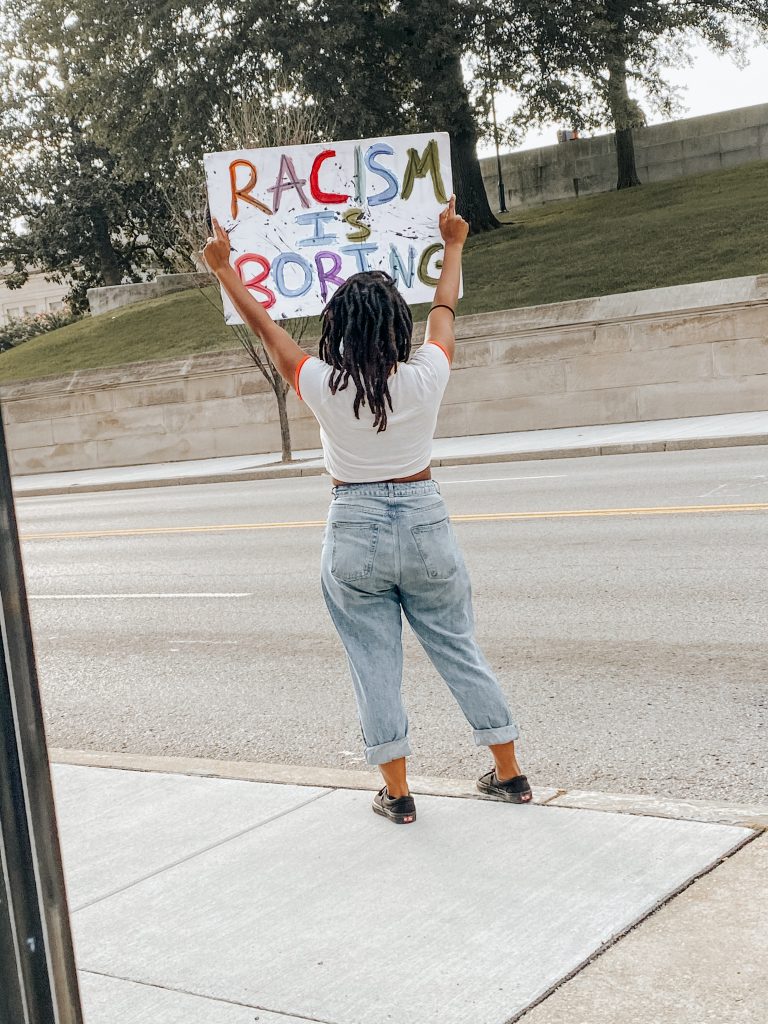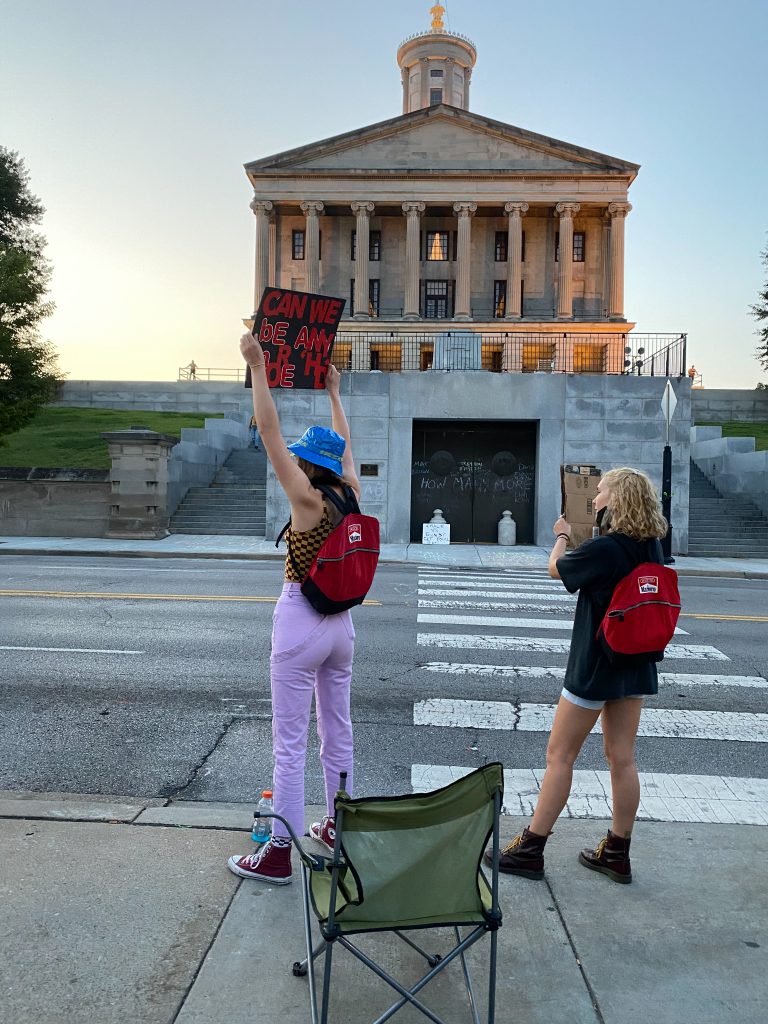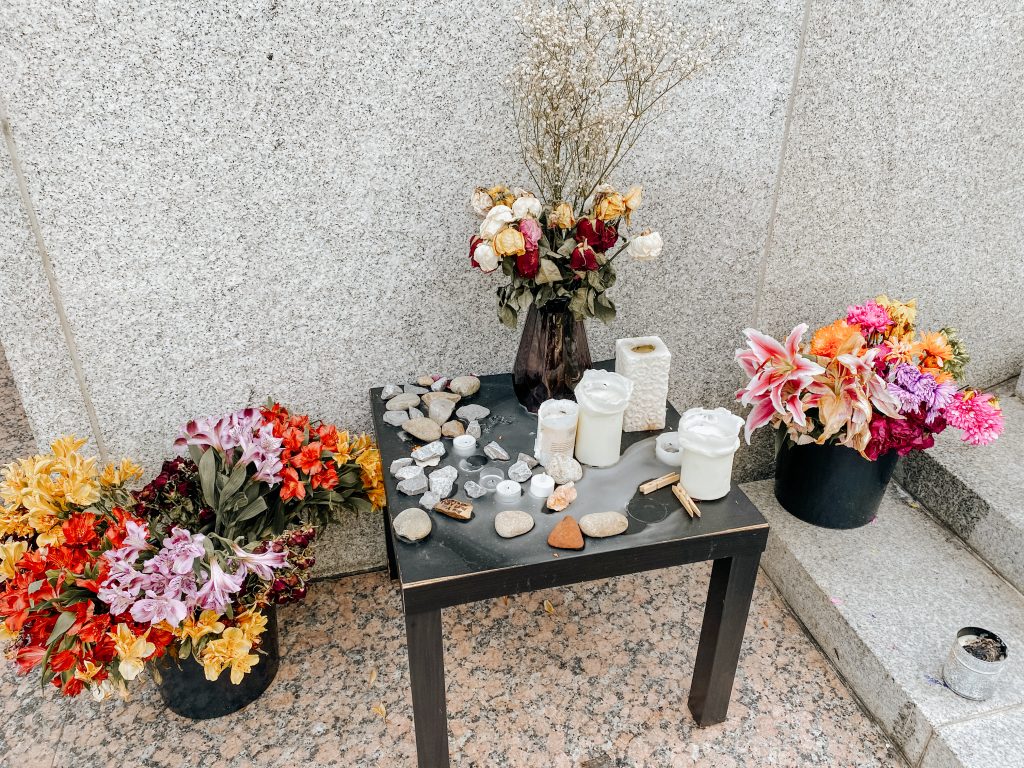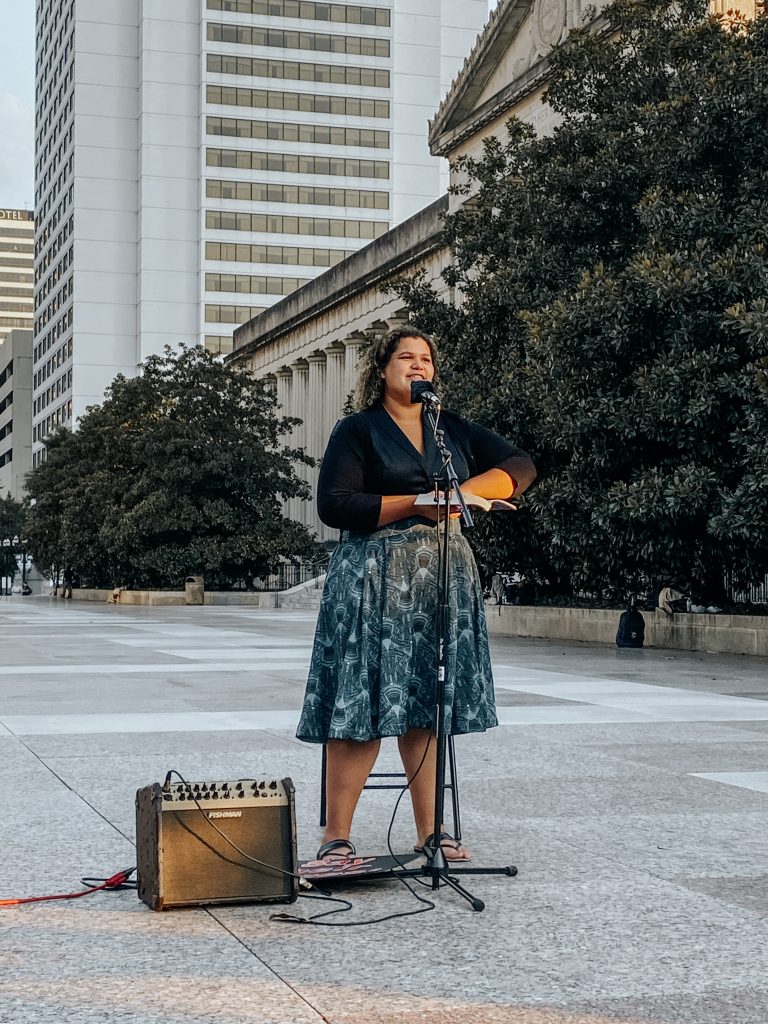Since the senseless murder of George Floyd in May, protests against institutionalized racism and police brutality have spread across America. These movements seek to curtail the use of excessive force against Black Americans and defund or fundamentally reform American policing. Our Novel Hand community has written about these escalating protests across the country, and provided antiracism resources for advocacy work. This week, I spoke with demonstrators in Nashville about one of the longest continuous protests in America, The People’s Plaza, to highlight local efforts to dismantle systemic racism.
Foundations of the Movement
After the death of George Floyd sparked national support for the Black Lives Matter movement, localized movements across the country considered the specific legacies of racism in their own communities. For organizers of The People’s Plaza, including Vanderbilt Divinity School student Justin Jones and civil rights advocate Rev. Venita Lewis, among many others, the infamous bust of former KKK Grand Wizard Nathan Bedford Forrest in the Tennessee State Capitol became a focal point in reckoning with Nashville’s racist history. After the widely attended Nashville Black Lives Matter protests in late May, these organizers acted upon the need to continue the momentum of the antiracism message.
On June 12, protesters gathered at Legislative Plaza outside of the Capitol. They reclaimed this plaza for the people, the source of the movement’s name, and renamed it Ida B. Wells Plaza in honor of the journalist and anti-lynching advocate who lived in Tennessee. They organized around four central demands, and committed to occupying the Plaza, day and night, until their demands are met. Today marks their 54th day of continuous occupation of the Plaza, and they remain steadfastly committed to the achievement of these demands.

Demands of The People
Remove Confederate Monuments
The People’s Plaza movement claims the display of Confederate statues makes environments that are “unsafe for communities of color.” To respond to some concerns about the erasure of history should these statues be removed, protesters instead hope that these statues can be displayed and contextualized in history museums. Though the Nathan Bedford Forrest bust is slated to be relocated to the Tennessee State Museum in February 2021, due to the efforts of these protesters, every day that it remains in the Capitol is another day it makes legislators of color feel unwelcome and unsafe.
Talk to Governor Bill Lee
While Governor Bill Lee called a meeting of the Tennessee State Capitol Commission on July 9 which ultimately resulted in a vote to remove the Forrest bust, Lee has largely criticized protestors at Ida B. Wells Plaza. Demonstrators hope to communicate directly with Governor Lee about their goals and policy demands. Dylan Irons, a graduate student arrested for doing calculus homework at the Plaza, described a disconnect between Governor Lee’s perception of protesters at the Plaza and their intentions.
“He thinks that the protesters are lawless and anarchists, but really we are just trying to get out the vote, exercising our first amendment rights, trying to speak with lawmakers, so, I think we must be pretty bad anarchists.”
Dylan Irons, Graduate Student at Vanderbilt University
Defund the Police
Though many may view this tenet of the movement as controversial, The People’s Plaza demonstrators argue that it is a vital step toward dismantling systemic racism in this country. They define defunding the police as diverting wasteful spending from police departments and reallocating those funds to under-resourced communities. This can lower cases of police brutality by fostering safer communities with reduced need of police presence, and free up additional funds for resources such as mental health counseling, educational programs, and housing assistance, among many other services.
Demilitarize the Police
More than 1000 people are killed every year by police in America. This staggering statistic reflects the prevalent use of lethal force by police officers. Solving this problem requires that police departments across the country no longer have access to military grade weaponry. Tennessee alone has received over $130,000,000 in military equipment from the federal government since 1990, with the vast majority distributed in the last decade. No police department in America needs to be militarized in order to complete its day-to-day operations.

Challenges to the Movement
Though The People’s Plaza movement is a transformative example of how people in solidarity with one another can accomplish impactful change, these successes have been challenged along the way. Repeated raids and arrests by members of the Tennessee Highway Patrol have been demoralizing and traumatizing for protesters. Irons, who has been detained twice, describes the arrests as arbitrary and targeted to intimidate and disperse protesters. Ranging from felony vandalism charges for names written in sidewalk chalk to illegal camping charges for falling asleep while protesting overnight, these arrests intimidate and deter many from choosing to protest.
Notably, on July 4, the Tennessee Highway Patrol arrested 55 nonviolent protesters. Micaiah Johnson faced her second arrest that night, describing an unbroken line of women holding onto each other as THP officers forcibly dragged protesters down the stairs of the Capitol to their arrests.
“There was an officer grabbing and pulling my legs and a woman was holding onto me. There was a sense of, ‘if they are taking us, they will take us all together.’ If you listen to the video with audio, there are a hundred people screaming, ‘let her go.’ I don’t remember the pain, though I was covered in bruises later, but I remember them screaming, ‘let her go.’”
Micaiah Johnson, Graduate Student at Vanderbilt University
The People’s Plaza has reported police brutality taking place during the arrest of peaceful protesters, as well as mistreatment of the protesters in custody. Protesters have been transported in windowless and unventilated vans while tightly restrained. They have been shackled together by their ankles in crowded cells meant only for one inmate. They have been forced to inhale mace sprayed in adjoining cells and faced potential exposure to COVID-19 in jail. These responses to a nonviolent, democratic protest reflect a disregard for the constitutional rights of the Nashvillians who defend Black Lives Matter and The People’s Plaza.

Julianne Adams, a graduate student in the English department at Vanderbilt, spoke about the importance of standing in solidarity with The People’s Plaza movement as a non-POC.
“A few times, our Black protesters have reminded us white allies that we volunteer to put our bodies at risk in the Plaza, whereas their bodies are constantly under threat wherever they go. That keeps me coming back, because even though I am exhausted, I’ve been cut up and bruised, I’ve had a panic attack, I’ve been arrested twice, it’s nothing to what the Black community — especially those who are not cis men — face every day.”
Julianne Adams, Graduate Student at Vanderbilt University
Finding Community in The People’s Plaza
Through all of these challenges, Ida B. Wells Plaza has become a center of strong community in Nashville. Demonstrators share a deep connection with one another, rooted in their shared passion for antiracism activism. Sharing meals together, doing yoga each morning, planning vigils, book readings, and movie screenings, and communicating ideas at General Assembly each night, The People’s Plaza movement is a poignant reminder of what can be accomplished through direct, sustained action. For Johnson, this community is part of what keeps her returning day after day to the protest.
“With John Lewis’s death, the message becomes so clear. John Lewis was first arrested for participating in sit-ins in Nashville. July 4 marked the largest mass arrest of 55 activists since the sit-ins in the 60s. There is a direct line between John Lewis and Justin Jones. We are part of an unbroken lineage of nonviolent resistance between generations happening here in Nashville. These things haven’t changed, so we really have to be here.”
Micaiah Johnson, Graduate Student at Vanderbilt University

Emily Radigan reflected upon the writing of Audre Lorde and Bell Hooks as she considered the sense of community shared by demonstrators at The People’s Plaza. She notes that the community built at Ida B. Wells Plaza requires “difficult, deliberate work” to construct, and has required protesters to “continuously struggle and negotiate differences and visions.” Echoing this sentiment, Johnson recalls her favorite element of the protest being its radical equality, which allows even the most recent arrivals to the protest to democratically participate in its work, so that everyone’s voice gets heard.
“I am reminded that justice, liberation, and community are intertwined efforts, and we cannot have one without the other.”
Emily Radigan, Graduate Student at Vanderbilt University
The Novel Hand community can help support the work of The People’s Plaza movement by checking out their website or their Instagram stories for updates on their pressing needs. They can almost always use water, ice, and sports drinks, but they also need people to come join the protest, even if they can only stop by for a few minutes. If you are not from Nashville or need to stay home due to the pandemic, they are also always seeking people who can help coordinate donations and who will sign their petitions.
- State of the UNIONS: Welcome to September’s Impactfull Series - September 2, 2022
- What We Can Learn from the Ukrainian Refugee Crisis - March 29, 2022
- The Olympic Effect: Changes in Host Communities - February 21, 2022
